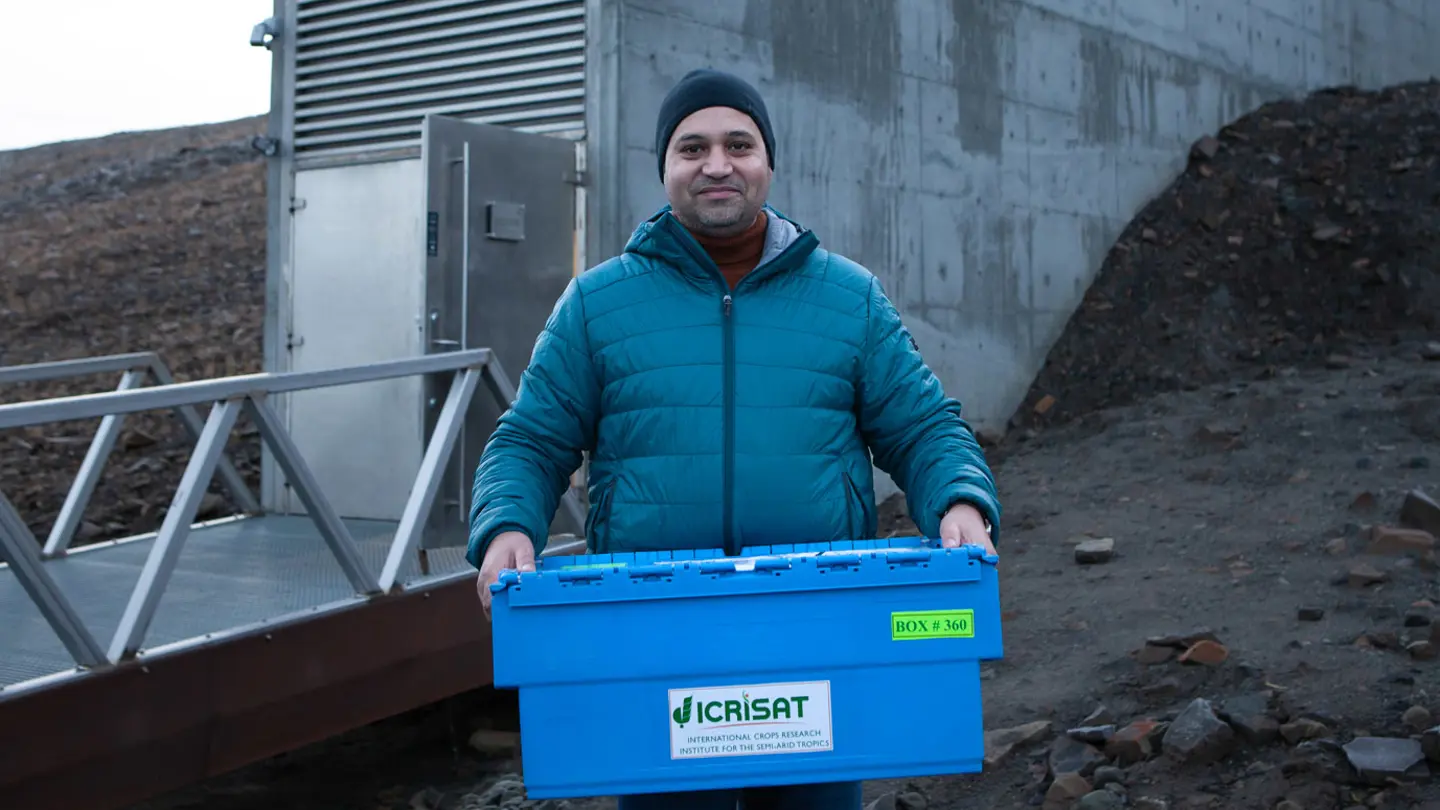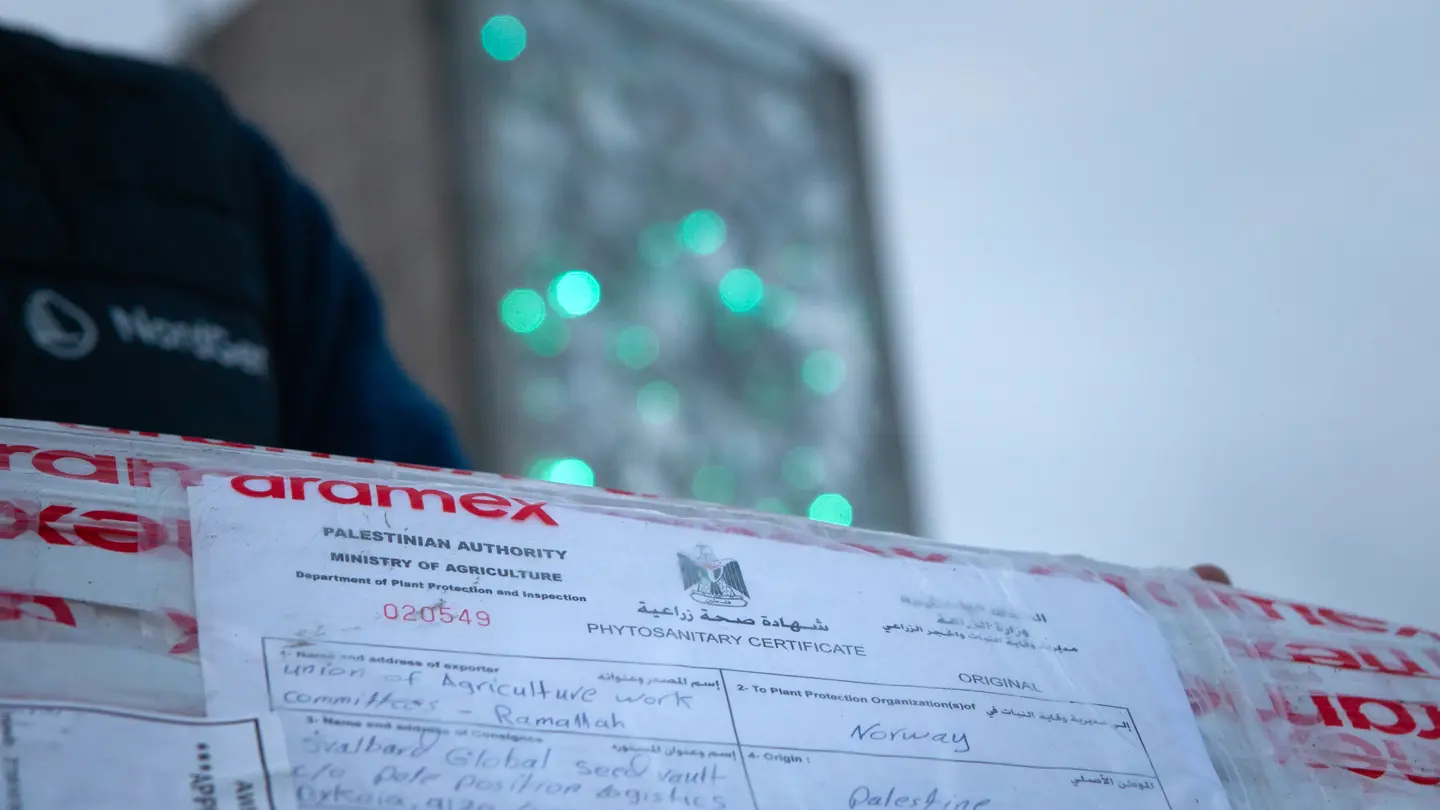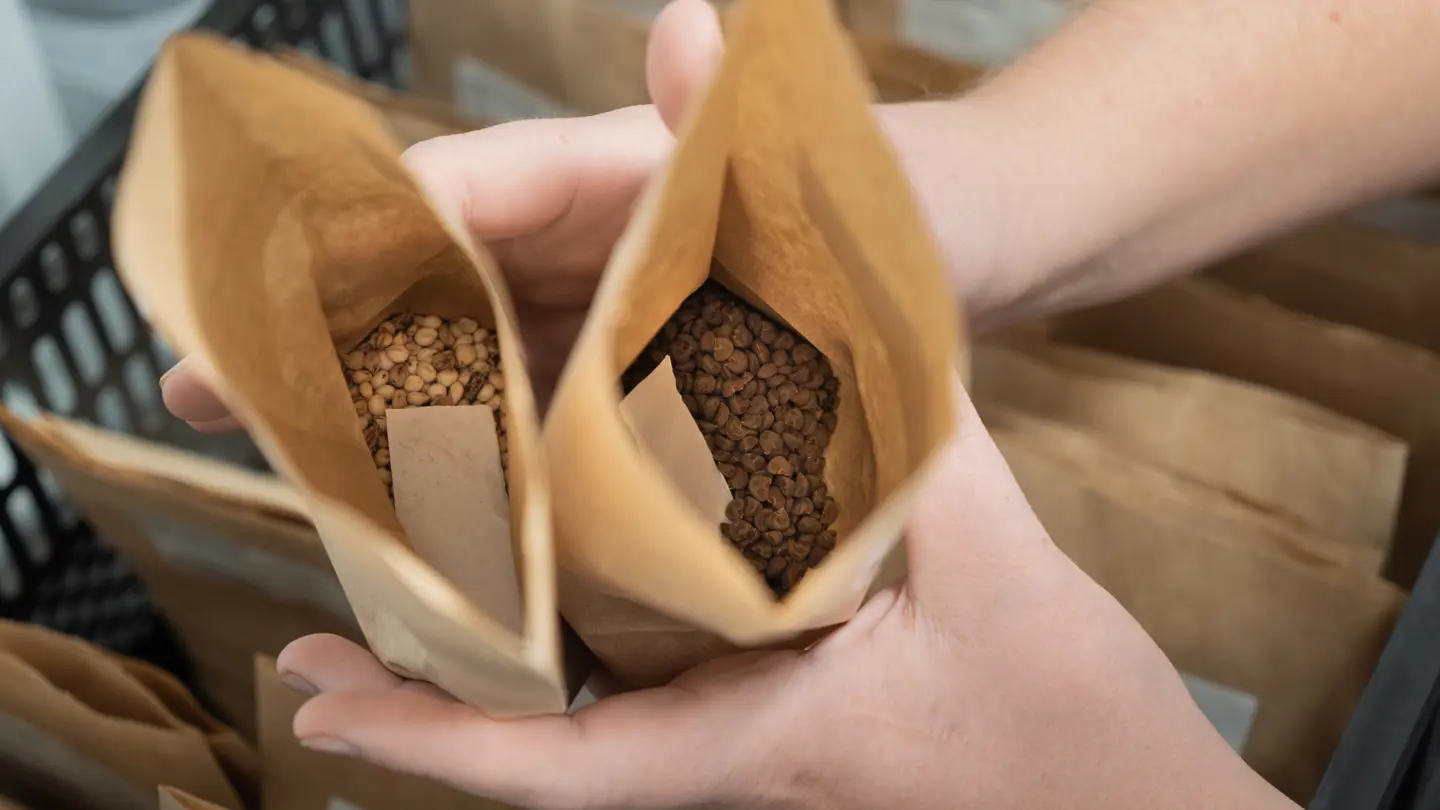October 23, 2024
Yesterday, more than 30,000 seed samples from 23 genebanks were secured in Svalbard Global Seed Vault. This seed deposit highlights the important function of the Seed Vault as backup facility available for genebanks from all over the world – not least in times of crisis.
On Tuesday, October 22, the ground surrounding Svalbard Global Seed Vault was bare except for a few patches of snow and ice. But deep down in the three chambers of the Seed Vault, there is a constant temperature of 18 degrees below zero. This day, the last seed deposit of the year began when NordGen’s staff carried close to 120 boxes into the portal building,
In total, 23 genebanks participated in the October deposit (see facts below for more information). One of these, The International Crops Research Institute for the Semi-Arid Tropics (ICRISAT), headquarterd in India, was present with one representative on Svalbard. The deposit from ICRISAT for example contained pearl millet, sorghum, chickpea, pigeonpea, peanut and five minor millets. After this deposit, around 97 percent of ICRISAT’s genbank collection is secured in Svalbard Global Seed Vault.
“It is important for ICRISAT to preserve the genetic diversity of its dryland legumes and cereals in the Seed Vault to ensure future crop development and food security for generations in dryland regions of Asia and Africa as well as to mitigate the risks of conflicts, politically instability and climate change," said Dr. Ovais Peerzada, Seed Laboratory Manager, ICRISAT.
 Dr. Ovais Peerzada, Seed Laboratory Manager, ICRISAT.
Dr. Ovais Peerzada, Seed Laboratory Manager, ICRISAT.
In addition to these seed samples, a box from ICRISAT that is part of the ”100-year experiment”, was also brougth into the Vault. Six genebanks (including NordGen who is also managing the project ) are part of this seed longevity experiment comprising seeds of globally important crops. The last box from ICRISAT means that all the seed samples included in the experiment are now in place in the seed vault.
Seven genebanks deposited seeds in the Seed Vault for the first time. Depositors from Chad, Bangladesh, Papua New Guinea, Nigeria, Bolivia and Suriname are part of the BOLD project run by the international organization Crop Trust. Another of the new depositors is the Union of Agricultural Work Committees (UAWC) which is based in Ramallah, Palestine. UAWC deposited 23 seed samples of various vegetables, legumes and herbs.
 Detail of the Palestinian box.
Detail of the Palestinian box.
A genebank from another conflict area had also planned to participate in the October deposit – The Agricultural Plant Genetic Resources Conservation and Research Center (APGRC), based in Sudan. Despite the ongoing war, and without access to the main genebank in the town of Wad Medani, genebank staff prepared hundreds of seed samples of sorghum and pearl millet with support from the Emergency Reserve for Genebanks a funding facility managed by the Crop Trust and the FAO International Treaty on Plant Genetic Resources. Genebank staff assembled the seeds despite war raging in the country and lack of access to the main national genebank in Wad Medani. Security trucks transported the seeds to Port Sudan for outward shipment. NordGen will sort, catalogue and dry the seed samples that are planned for the next scheduled deposit in February 2025.
“Humanity depends on a wide diversity of genetic resources to meet future challenges. Therefore, it is gratifying that many genebanks choose to be part of this seed deposit," said Lise Lykke Steffensen, Executive Director of the Nordic Genetic Resource Center (NordGen). “The Seed Vault has an important purpose to secure these valuable collections, not least given the state of the world today. We are pleased to continue working on this task.”
 Sudanese seed samples of sorghum and Roselle in NordGen's drying room.
Sudanese seed samples of sorghum and Roselle in NordGen's drying room.
The Seed Vault
Svalbard Global Seed Vault is established and owned by Norway and operated in a partnership between the Norwegian Ministry of Agriculture and Food, NordGen and Crop Trust.
The October deposit
Genebank – Country – Seed Samples (30,061 in total)
IRRI – Philippines – 7260
CIMMYT – Mexico – 5442
ICRISAT – India – 2950
ICARDA – Morocco – 2292
World Vegetable Centre (Tanzania department) – Taiwan – 2137
ILRI – Ethiopia – 1750
SPGRC – Zambia – 433
CIP – Peru – 20
IHAR – Poland – 1290
Suceava Genebank ”Mihai Cristea” – Romania – 158
NRSSL– Thailand –72
UAWC – Palestine – 23
ITRAD – Chad – 1145
NPGRL– Philippines –983
UBT – Albania – 850
BRAC – Bangladesh – 725
SNRI/ADRON – Suriname –577
NARI – Papua New Guinea – 520
IASA (Fac. Ciencias Agrarias) – Bolivia – 500
ZARI – Zambia – 392
Institut d'Economie Rurale – Mali – 212
NIHORT – Nigeria – 200
University of Costa Rica – Costa Rica – 130